- New Holland Tractor Dash Symbols, Indicators & Lights
- All New Holland Dashboard Symbols
- General Instrument Cluster Symbols
- Engine-related Dash Symbols
- Body-related Dash Symbols
- PTO-related Dash Symbols
- Hydraulic-related Dash Symbols
- Loader-related Dash Symbols
- Electric-related Dash Symbols
- Colors of New Holland Tractor Warning Lights
- How to Reset New Holland Warning Lights?
New Holland dashboard symbols, indicators, warning lights and gauges provide crucial information to operators about the tractor’s status and potential issues. These symbols and lights are designed to alert operators to various conditions, allowing them to take appropriate actions to ensure safe and efficient operation. Whether it’s indicating low fuel levels, activating four-wheel drive, or warning of engine malfunctions, understanding these dashboard symbols is essential for operating New Holland tractors effectively and safely.
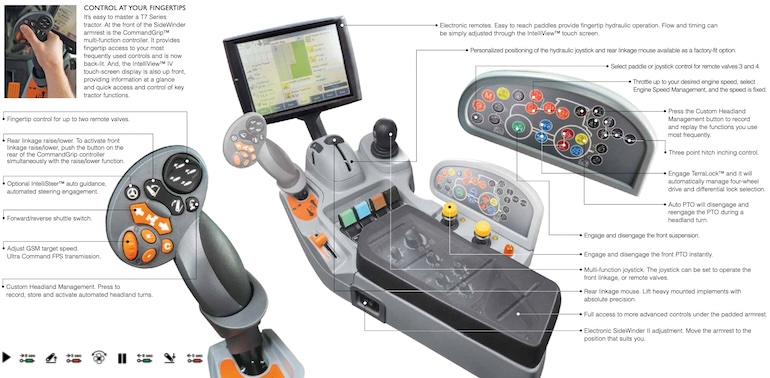
The New Holland instrument cluster introduces several new features and enhancements designed to improve functionality, performance, and user experience. The dashboard is equipped with enhanced diagnostic capabilities, allowing for quick and accurate troubleshooting of potential issues or malfunctions. This helps minimize downtime and optimize productivity by swiftly identifying and resolving problems. The dashboard shows error codes to alert the operator about any issues or faults in the tractor’s systems, allowing for timely troubleshooting and maintenance. Operators have the option to customize certain settings and preferences within the instrument cluster, allowing for personalized user experiences tailored to specific needs or preferences.
New Holland Tractor Dash Symbols, Indicators & Lights
Modern instrument panels might feature the speedometer, tachometer, odometer, engine coolant temperature gauge, and fuel gauge, alongside turn signals, gearshift position indicator, seat belt warning light, parking brake warning light, and engine malfunction indicators. New Holland T6010 tractor gauges, indicators and warning lights meaning:
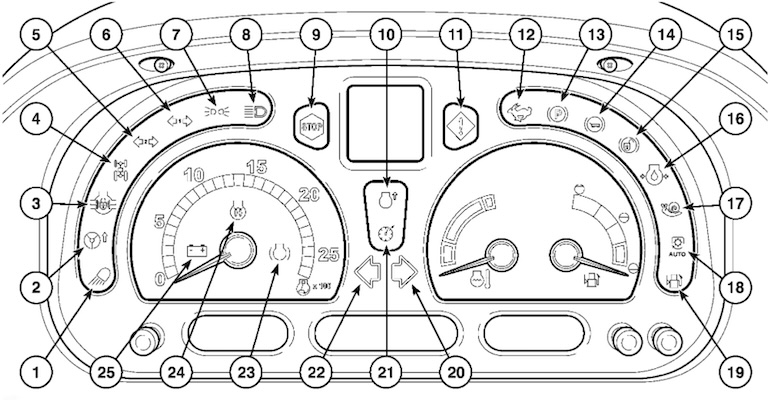
- Work Light – Illuminates when work lights are activated.
- Fast Steer – Illuminates when the fast steer function is activated.
- Differential Lock – Illuminates when the differential lock is engaged.
- Four-wheel Drive – Illuminates when the drive to the front wheels is engaged.
- Trailer Turn Signal (Second Trailer) – Flashes with tractor/trailer turn signals when a second trailer is attached.
- Trailer Turn Signal (Single Trailer) – Flashes with tractor/trailer turn signals when a trailer is attached.
- Parking Lights – Illuminates when the tractor lights are switched on.
- Headlight High Beam – Illuminates when the tractor lights are switched to high beam.
- Red Stop Light – Indicates a critical issue. Stop the tractor immediately and investigate the cause.
- Engine Power Boost Activated – Indicates activation of the power boost function, accompanied by a symbol in the Display.
- Amber Warning Light – Indicates a warning, accompanied by a symbol in the Display. Stop the tractor and investigate the cause.
- Direct Drive Indicator (Dual Command Transmission) – Illuminates to indicate the transmission is in direct drive mode.
- Parking Brake – Flashes with key-start switch on and parking brake applied. A warning buzzer will sound if the handbrake is not applied when the key-start switch is turned off or if the operator leaves the seat without applying the handbrake.
- Trailer Brake Pressure (Italy Only) – Illuminates to indicate low hydraulic oil pressure to the trailer brake circuit. Stop the tractor and investigate the cause.
- Brake Pedals Not Latched (Japan Only) – Illuminates to show when pedal latch is unlocked.
- Engine Oil Pressure Low – Indicates low engine oil pressure. Stop the engine and investigate the cause.
- Creeper Gears – Illuminates when creeper gears are engaged.
- Auto PTO – Illuminates when the Auto PTO is enabled. Flashes when the implement is raised and becomes steady when the implement is lowered into work.
- Fuel Level Low – Illuminates when the tractor requires refueling.
- Right Turn Indicator – Flashes with tractor right-hand turn signal. Sounds intermittent alarm if indicator is not cancelled.
- Engine Speed Management – Illuminates when Engine Speed Management is activated.
- Left Turn Indicator – Flashes with tractor left-hand turn signal. Sounds intermittent alarm if indicator is not cancelled.
- Engine Exhaust Brake – Illuminates when the exhaust brake system is activated.
- Cold Start Device – Illuminates when the grid heater is activated using the key-start switch.
- Alternator – Illuminates continuously to indicate the alternator is not charging the battery.
All New Holland Dashboard Symbols
Understanding the symbols on your CNH tractor’s digital instrument panel is crucial for proper operation and maintenance. Here’s a list of common New Holland tractor dashboard symbols along with their meanings:
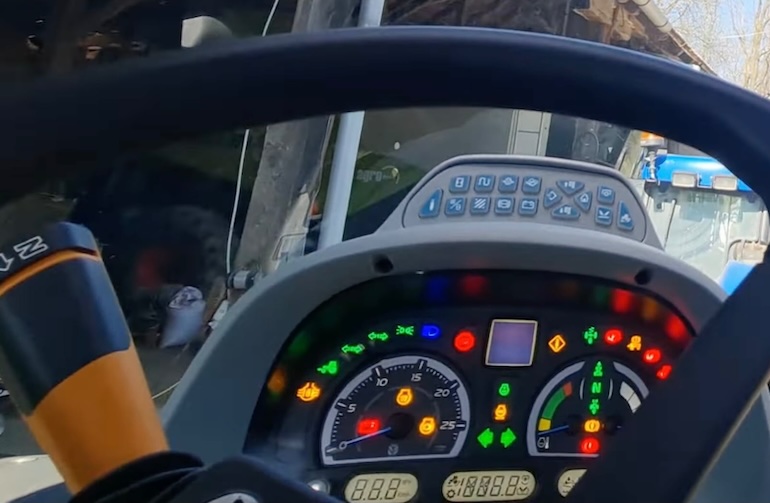
These symbols may vary slightly depending on the specific model of the New Holland tractor, so it’s always advisable to refer to the tractor’s operator manual for precise details.
General Instrument Cluster Symbols
| Symbol | Name | Instrument Panel Symbol Description |
|---|---|---|
 |
Safety Alert Symbol | Indicates a safety alert or warning. |
 |
Stop | Indicates a serious tractor malfunction in the tractor’s systems that requires immediate attention. |
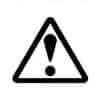 |
Master System Warning | Alerts about a critical issue with the tractor’s master system. |
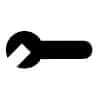 |
Service | Indicates that the tractor requires servicing or maintenance. |
 |
Malfunction! | See Operator’s Manual |
 |
Malfunction (Alternative) | Indicates the need to consult the operator’s manual for information |
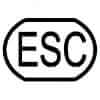 |
Escape | Allows exiting a menu or mode. |
 |
Fast | Indicates a high-speed setting or mode. |
 |
Slow | Indicates a low-speed setting or mode. |
 |
Creep | Indicates engagement of the tractor’s super creep gear, which provides exceptionally slow speeds for specific applications. |
 |
High Speed Travel | Indicates that the tractor is operating in high speed travel mode. |
 |
Mid Speed Travel | Shows the tractor is operating at medium speed. |
 |
Low Speed Travel | Signals the tractor is in low-speed mode. |
 |
High Range | Indicates that the tractor is in high gear range, suitable for higher speed operations. |
 |
Mid Range | Shows the transmission is in medium gear range. |
 |
Low Range | Indicates that the tractor is in low gear range, suitable for lower speed operations requiring more power. |
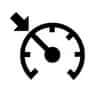 |
Cruise Control | Indicates that cruise control is engaged. Maintains a constant speed set by the operator. |
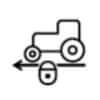 |
Tractor Cruise Control | Indicates that the cruise control feature is activated, maintaining a set speed without manual throttle control. |
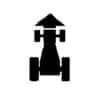 |
Ground Speed | Displays the current ground speed of the tractor, allowing for precise control. |
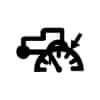 |
Speed Limit Switch | Indicates that the speed limit feature is activated, restricting the tractor’s maximum speed. |
 |
Limp Home | Activates a reduced power mode for emergency situations. |
 |
Lock | Indicates that a function or system is locked or engaged. |
 |
Unlock | Indicates that a function or system is unlocked. |
 |
ON (Engaged) | Indicates that a system or function is active or engaged. |
 |
OFF (Disengaged) | Indicates that a system or function is inactive or disengaged. |
 |
Transmission Neutral Indicator | indicates that the tractor is in neutral gear. This light signifies that the transmission is in a neutral position, meaning the tractor is not engaged in any forward or reverse movement. |
 |
Operator Presence Sensor (OPS) | Illuminates when the tractor operator’s seat is unoccupied, reminding the operator to sit properly for safe operation. |
 |
Operator Presence Sensor | Illuminates when the tractor operator’s seat is unoccupied. |
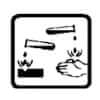 |
Warning! Corrosive Substance | Indicates the presence of a corrosive substance. Use caution when handling. |
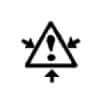 |
Pressurised Open Carefully | Warns to open a pressurized component carefully to avoid injury. |
 |
Hazard Warning Lights | Activates the hazard lights to warn others of potential danger. |
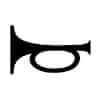 |
Audible Warning Device | Indicates the status of the audible warning device. |
Engine-related Dash Symbols
| Symbol | Name | Instrument Panel Symbol Description |
|---|---|---|
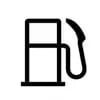 |
Fuel Level | Indicates the level of fuel in the tank. |
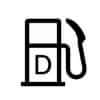 |
Diesel Fuel | Indicates the level of diesel fuel in the tank. |
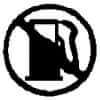 |
Automatic Fuel Shut-off | Signals that the automatic fuel shut-off system is active, preventing fuel flow. |
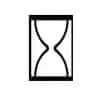 |
Hourmeter / Elapsed Operating Hours | Displays the total operating hours or elapsed time. |
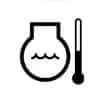 |
Engine Temperature / Coolant Temperature | Warns the operator when the engine coolant temperature exceeds safe operating limits, indicating potential overheating. |
 |
Low Coolant Level | Warns that the engine coolant level is low and needs to be refilled. |
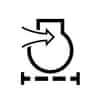 |
Engine Intake / Combustion Air Filter | Indicates the condition of the engine air filter. Warns the operator when the air filter becomes clogged or restricted, reducing airflow to the engine and affecting performance. |
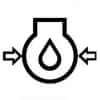 |
Engine Oil Pressure | Indicates the oil pressure in the engine. Warns the operator when engine oil pressure drops below a safe level, indicating potential engine damage or oil system malfunction. |
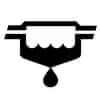 |
Water Separator | Indicates the status of the water separator in the fuel system. |
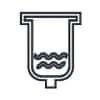 |
Water in Fuel Warning | Indicates that there is water in the diesel fuel. This can be a serious issue, as water in diesel fuel can cause damage to the engine and fuel system. |
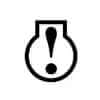 |
Engine Warning | Indicates the presence of a fault code or error condition in the engine control system, prompting the operator to address the issue promptly. |
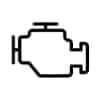 |
Engine Alert | Indicates various functions and warnings related to the engine and its operation (Engine Check). |
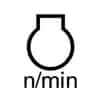 |
Engine Rotational Speed | Displays the rotational speed of the engine. |
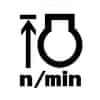 |
Engine Rev Limiter | Limits the maximum engine speed to prevent damage. |
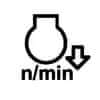 |
Engine Over Speed | Alerts when the engine exceeds its maximum safe speed. |
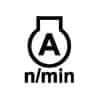 |
Engine RPM Memory A | Stores and recalls a specific engine RPM setting. |
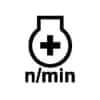 |
Engine RPM Adjuster | Allows adjustment of the engine RPM. |
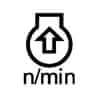 |
Engine RPM Increase | Increases the engine RPM. |
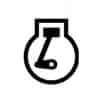 |
Engine Run | Indicates that the engine is running. |
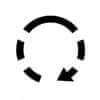 |
Engine Start | Initiates the engine starting process. |
 |
Engine Stop | Stops the engine. |
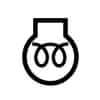 |
Engine Heater (Low Temperature Start Aid) | Illuminates when the engine block heater is in operation, helping to warm the engine for easier starting in cold conditions. Diesel Preheat / Glow Plugs. |
 |
Diesel Engine Preheat | Indicates that the diesel engine preheat function is active, aiding in cold starts. (Low Temperature Start Aid) |
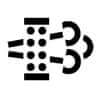 |
Regeneration | Initiates the regeneration process for the diesel particulate filter. |
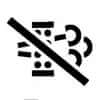 |
Regeneration Inhibit | Prevents regeneration from occurring. |
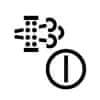 |
Regeneration Switch | Activates the regeneration process manually. |
 |
Parked Regeneration | Initiates regeneration while the vehicle is stationary. |
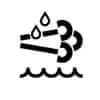 |
DEF / AdBlue-Level | Indicates the level of Diesel Exhaust Fluid (DEF) or AdBlue. |
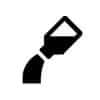 |
DEF / AdBlue Low Level | Alerts when the DEF or AdBlue level is low. |
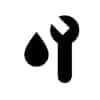 |
DEF / AdBlue Poor Quality | Alerts when the quality of DEF or AdBlue is compromised. |
 |
DEF / AdBlue Trouble | Indicates a problem with the DEF or AdBlue system. |
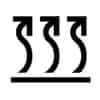 |
DEF / AdBlue Freeze | Alerts when DEF or AdBlue is at risk of freezing. |
Body-related Dash Symbols
| Symbol | Name | Instrument Panel Symbol Description |
|---|---|---|
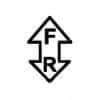 |
Travel Direction | Indicates the current direction of tractor travel. |
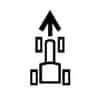 |
Travel Direction Forward | Indicates forward travel direction. |
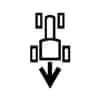 |
Travel Direction Rearward | Indicates reverse travel direction. |
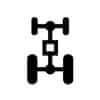 |
4-Wheel Drive On | Indicates that the tractor’s 4-wheel drive system is engaged. |
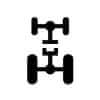 |
4-Wheel Drive Off | Indicates that the tractor’s 4-wheel drive system is disengaged. |
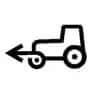 |
Four-wheel On | Engages the four-wheel drive system. |
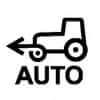 |
Four-wheel Automatic | Automatically adjusts the four-wheel drive system based on conditions. |
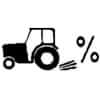 |
% Age Slip | Displays the percentage of slippage in the transmission or drive system |
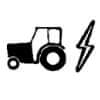 |
Implement Socket | Shows the status of the implement socket, ensuring proper connection and power supply to attached implements. |
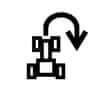 |
Headland Management System | Manages tractor operations during headland turns. |
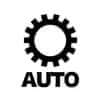 |
Auto Transmission | Engages automatic transmission mode. |
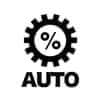 |
Auto Transmission Sensitivity | Adjusts the sensitivity of the automatic transmission. |
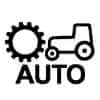 |
Auto Transmission Road Control | Optimizes transmission settings for road conditions. |
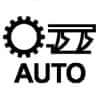 |
Auto Transmission Field Control | Optimizes transmission settings for field conditions. |
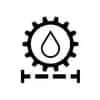 |
Transmission Oil Filter | Indicates a restricted or clogged transmission oil filter, which can impede hydraulic function and transmission performance. |
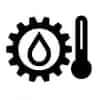 |
Transmission Oil Temperature | Warns the operator when the transmission oil temperature exceeds safe operating levels, indicating potential overheating or insufficient cooling. |
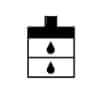 |
Hydraulic / Transmission Filters | Warns of potential issues with the hydraulic or transmission filters, indicating a need for service or replacement. |
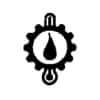 |
Rear Axle Oil Temperature | Indicates the temperature of the oil in the rear axle, ensuring it remains within safe operating limits. |
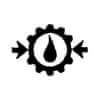 |
Transmission Oil Pressure | Warns of low transmission oil pressure, which could affect transmission performance. |
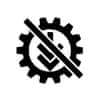 |
Gear Shifting Warning | Indicates a problem with gear shifting. |
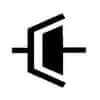 |
Clutch | Engages or disengages the tractor clutch. |
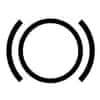 |
Brake | Alerts the operator to low brake fluid levels in the tractor’s brake system, indicating potential brake failure or leakage. |
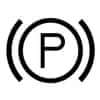 |
Parking Brake | Engages the tractor parking brake. Illuminates when the handbrake or parking brake is engaged, reminding the operator to disengage it before driving. |
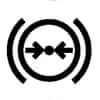 |
Air Brake | Indicates the status of the air brake system. |
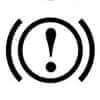 |
Brake Failure / Malfunction | Alerts about brake system failure or malfunction. |
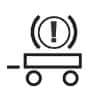 |
Trail Brakes | This light will come on when the trailer brakes are active. |
 |
Trailer Brake | Indicates the status of the trailer brake system, ensuring safe towing operations. |
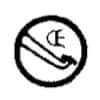 |
Stop Lamps | Indicates that the stop lamps are activated, alerting others that the tractor is stopping. |
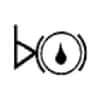 |
Brake Fluid Level | Warns that the brake fluid level is low, which may affect braking performance. |
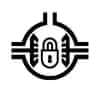 |
Differential Lock | Indicates engagement of the tractor’s differential lock, enhancing traction in slippery or uneven terrain. |
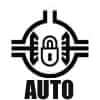 |
Differential Lock Automatic | Automatically engages the differential lock based on conditions. |
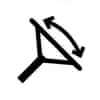 |
Steering Wheel Tilt | Adjusts the tilt angle of the steering wheel. |
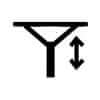 |
Steering Wheel Telescope | Adjusts the telescoping position of the steering wheel. |
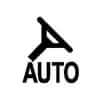 |
Automatic Steering Control | Engages automatic steering control. |
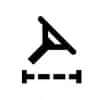 |
Steering Oil Filter | Indicates the status of the steering oil filter. |
 |
Front Suspension | Indicates the status of the front suspension system. |
 |
Front Suspension Automatic | Automatically adjusts the front suspension based on conditions. |
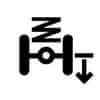 |
Front Suspension Down | Lowers the front suspension. |
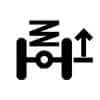 |
Front Suspension Up | Raises the front suspension. |
 |
Front Suspension Lock | Locks the front suspension in position. |
PTO-related Dash Symbols
| Symbol | Name | Instrument Panel Symbol Description |
|---|---|---|
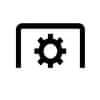 |
PTO Off (Disengaged) | Deactivates the power take-off. |
 |
PTO On (Engaged) | Activates the power take-off. |
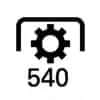 |
PTO 540 rpm | Indicates engagement of the tractor’s power take-off (PTO) system at 540 revolutions per minute. |
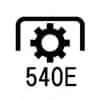 |
PTO 540E rpm | Indicates the power take-off speed of 540E rpm. |
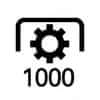 |
PTO 1000 rpm | Indicates engagement of the tractor’s power take-off (PTO) system at 1000 revolutions per minute. |
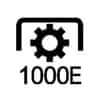 |
PTO 1000E rpm | Indicates the power take-off speed of 1000E rpm. |
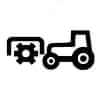 |
PTO Front | Indicates the front power take-off is active for front-mounted implements. |
 |
PTO F Front | Indicates the front power take-off is active for front-mounted implements. |
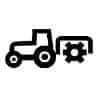 |
PTO Rear | Indicates the rear power take-off is active for front-mounted implements. |
 |
PTO R Rear | Indicates the rear power take-off is active for front-mounted implements. |
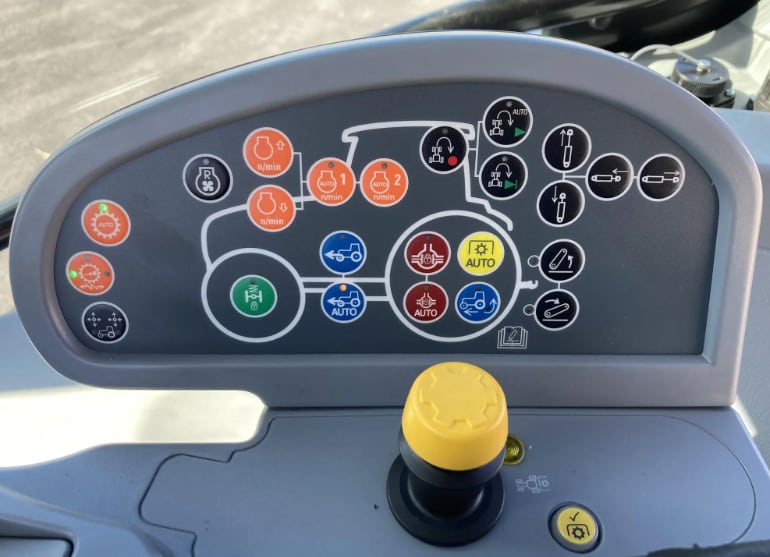
Hydraulic-related Dash Symbols
| Symbol | Name | Instrument Panel Symbol Description |
|---|---|---|
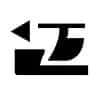 |
Draft Control | Manages the draft control system for implements. |
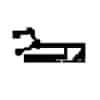 |
Draft Control | Shows the status of the draft control system, which adjusts the implement depth based on soil resistance. |
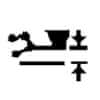 |
Position Control | Indicates the position control function, which maintains a set height for the tractor’s implement. |
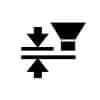 |
Position Control | Controls the height or position of attached implements. |
 |
Automatic Draft Operation | Indicates that the automatic draft control system is active, maintaining consistent soil penetration. |
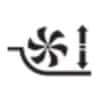 |
Automatic Tilling Depth Operation | Indicates that the automatic tilling depth control is active. |
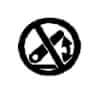 |
Hitch Disabled | Alerts that the tractor’s hitch system is disabled, preventing attachment movements. |
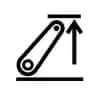 |
Lift Arm Control Up / Transport | Raises or lowers lift arms for transport mode. |
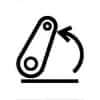 |
Lift Arm Control Upward | Raises tractor lift arms. |
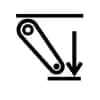 |
Lift Arm Control Down | Lowers tractor lift arms. |
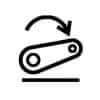 |
Lift Arm Control Downward | Lowers lift arms. |
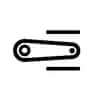 |
Lift Arm Control Block | Locks lift arms in position. |
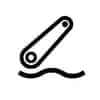 |
Lift Arm Control Float | Allows tractor lift arms to float. |
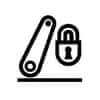 |
Lift Arm Control Lock | Locks tractor lift arm controls. |
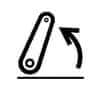 |
3-Point Lifting / Lowering | Controls the three-point hitch for lifting or lowering implements. |
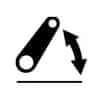 |
Lift Arm Height | Indicates the height of the lift arms. |
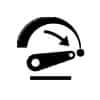 |
Position Control – Lowering | Indicates the position control lever is in the lowering position for the implement. |
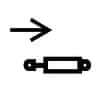 |
Remote Cylinder Retract | Retracts remote hydraulic cylinders. |
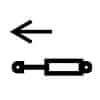 |
Remote Cylinder Extend | Extends remote hydraulic cylinders. |
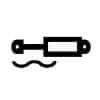 |
Remote Cylinder Float | Allows remote hydraulic cylinders to float. |
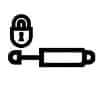 |
Remote Cylinder Lock A | Locks remote hydraulic cylinder control. |
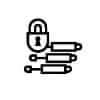 |
Remote Cylinder Lock B | Locks remote tractor hydraulic cylinder control. |
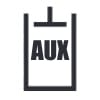 |
Auxiliary Operation Indicator | Indicates that an auxiliary function is active. |
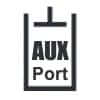 |
Auxiliary Hydraulic Port | Shows the status of auxiliary hydraulic ports. |
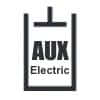 |
AUX Electric Port | Shows the status of the auxiliary electric port. |
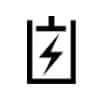 |
AUX Electric Port indicator | Indicates that the auxiliary electric port is active. |
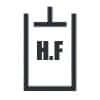 |
High Flow Indicator | Indicates that the hydraulic system is operating in high flow mode. |
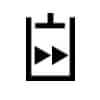 |
High Flow | Indicates high hydraulic flow is active. |
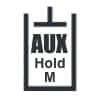 |
AUX Hydraulic Port Hold M/F | Indicates the auxiliary hydraulic port hold mode/function is active. |
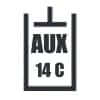 |
AUX 14-Pin C Symbol | Shows the status of the 14-pin auxiliary electrical connector. |
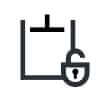 |
Hydraulic Lock Device | Indicates that the hydraulic lock device is engaged, preventing unintended hydraulic movements. |
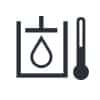 |
Hydraulic Oil Temperature | Hydraulic oil temperature warning light. |
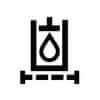 |
Hydraulic Oil Filter | Indicates the status of the hydraulic oil filter. |
Loader-related Dash Symbols
| Symbol | Name | Instrument Panel Symbol Description |
|---|---|---|
 |
Lift Arm Raise / Bucket Up | Indicates the lift arm is raising or the bucket is being lifted |
 |
Lift Arm Lower / Bucket Down | Indicates the lift arm is lowering or the bucket is being lowered |
 |
Loader Bucket Dump | Indicates the Kubota loader bucket is being dumped |
 |
Loader Bucket Rollback / Tilt | Indicates the loader bucket is being rolled back or tilted |
 |
Loader Bucket Float | Indicates the Kubota loader bucket is in float mode |
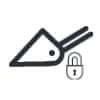 |
Loader Quick Hitch Lock | Indicates the loader quick hitch is locked. Locks the loader bucket or attachment into position quickly |
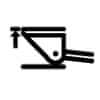 |
Loader Bucket Self Leveling | Indicates the loader bucket is self-leveling. Automatically adjusts the loader bucket to maintain a level position |
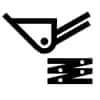 |
Ride Control | Indicates that the ride control feature is active, improving ride comfort by damping loader arm movements. |
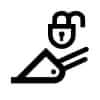 |
Quick Attachment Unlock | Indicates that the quick attachment locking mechanism is disengaged / the quick attachment system is unlocked. |
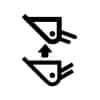 |
Self Leveling Indicator | Indicates that the self-leveling function of the loader is active, keeping the bucket level as the arms are raised or lowered. |
 |
Tailgate Safety Cover | Shows the tailgate safety cover is engaged. |
Electric-related Dash Symbols
| Symbol | Name | Instrument Panel Symbol Description |
|---|---|---|
 |
Battery Charging Condition | Indicates a malfunction in the tractor’s charging system, typically caused by a faulty alternator or battery, which may result in battery discharge. |
 |
Electrical Power Accessories | Indicates the status of electrical power accessories. |
 |
Master Lighting Switch | Controls the master lighting system. |
 |
Headlight Low Beam | Activates low beam headlights. |
 |
Headlight High Beam | Illuminates the tractor’s headlights for visibility in low-light conditions or during nighttime operation. |
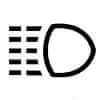 |
Headlight Flashing | Activates the headlight flash function. |
 |
Work Light | Activates tractor work lights. |
 |
Position Lamps | Controls position lamps. |
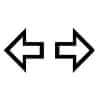 |
Turn Signal | Activates tractor turn signals. |
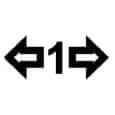 |
Turn Signal Trailer | Activates turn signals for trailers. |
| Beacon Light | Controls beacon lights. | |
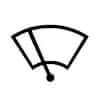 |
Windshield Wiper | Activates windshield wipers. |
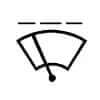 |
Windshield Wiper Intermittent | Activates intermittent windshield wiper function. |
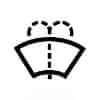 |
Windshield Washer | Activates windshield washer. |
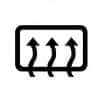 |
Rear Window Defroster | Activates rear window defroster. |
 |
Air Conditioner | Activates air conditioner. |
 |
Heater Fan | Indicates that the heater fan is operational, providing ventilation or warmth to the cab. |
If a warning light comes on and you are unsure of its meaning, it’s advisable to consult the tractor’s manual or seek professional assistance to avoid potential damage for New Holland tractor models:
- 10S Series – 5610S, 6610S, 7610S, 7810S, 8010;
- 15 Compact Series – New Holland 1215;
- 30 Series – 3430, 3930, 4630, 5030, 7630, 7630, 8030;
- 35 Series – 4635, 4835, 5635, 6635, 7635;
- 60 Gemini Series – 8160, 8260, 8360, 8560;
- 70 Genesis Series – 8670, 8770, 8870, 8970;
- 70A Series – 8670A, 8770A, 8870A, 8970A;
- 80 Series – 9280, 9480, 9680, 9880;
- 84 Series – 9184, 9384, 9484, 9684, 9082 Series – 9282, 9482, 9682, 9882;
- Boomer Series – 1530, 1630, 1725, 1925, Boomer 8N, 20, 24, 25, 30, 33, 35, 37, 40, 41, 45, 45D, 46D, 47, 50, 50D, 54D, 55, 3040, 3045, 3050, 4055, 4060;
- Boomer TC Series – TC18, TC21, TC24D, TC25, TC29, TC33, TC35, TC40, TC45;
- Boomer TC-A Series – TC21DA, TC23DA, TC24DA, TC26DA, TC29DA, TC31DA, TC33DA, TC34DA, TC35A, TC40A, TC45A, TC48DA, TC55DA;
- Boomer TZ Series – TZ18DA, TZ22DA, TZ24DA, TZ25DA;
- Genesis T8 Series – New Holland T8.420;
- PowerStar Series – PowerStar 65, 75, 90, 100, 110, 120;
- PowerStar 40 Series – 5640, 6640, 7740, 7840, 8240, 8340;
- PowerStar T4 Series – T4.55, T4.65, T4.75;
- T1000 Series – T1010, T1030;
- T1500 Series – T1510, T1520, T1530;
- T2300 Series – T2310, T2320, T2330;
- T2400 Series – T2410, T2420;
- T3000 Series – T3010, T3020, T3030, T3040;
- T4 Series – New Holland T4.100, T4.105, T4.110, T4.115, T4.120, T4.85, T4.90, T4.95;
- T4 PowerStar Series – T4.100, T4.65, T4.75, T4.90;
- T4000 Series – T4020, T4030, T4040, T4050;
- T5 Series – T5.100, T5.105, T5.110, T5.115, T5.120, T5.130, T5.140, T5.90, T5.95;
- T5000 Series – T5040, T5050, T5060, T5070;
- T6 Series – New Holland T6.120, T6.140, T6.145, T6.150, T6.155, T6.160, T6.165, T6.175, T6.180;
- T6000 Series – T6010, T6020 Delta, T6030 Plus, T6040 Elite, T6050 Delta, T6060 Elite, T6070 Plus, T6080 Elite;
- T7 Series – New Holland T7.170, T7.175, T7.185, T7.190, T7.200, T7.210, T7.220, T7.230, T7.235, T7.245, T7.250, T7.260, T7.270, T7.290, T7.315;
- T7000 Series – T7030, T7040, T7050, T7060, T7070;
- T7500 Series – T7530, T7550;
- T8 Series – New Holland T8.275, T8.300, T8.320, T8.330, T8.350, T8.360, T8.380, T8.390, T8.410, T8.435;
- T8000 Series – T8010, T8020, T8030, T8040, T8050;
- T9 Series – New Holland T9.390, T9.435, T9.450, T9.470, T9.480, T9.505, T9.520, T9.530 SmartTrax II, T9.560, T9.565 SmartTrax II, T9.580, T9.600 SmartTrax II, T9.615, T9.645 SmartTrax II, T9.655, T9.670, T9.700 SmartTrax II;
- T9000 Series – T9020, T9030, T9040, T9050, T9060;
- TB Series – TB100, TB110, TB120;
- TD5000 Series – TD5010, TD5020, TD5030, TD5040, TD5050, TD5050HC;
- TDD Series – TD75D, TD80D, TD85D, TD95D;
- TG Series – TG210, TG230, TG255, TG285;
- TG II Series – TG215, TG245, TG275, TG305;
- TJ I Series – TJ275, TJ325, TJ375, TJ425, TJ450, TJ500;
- TJ II Series – TJ280, TJ330, TJ380, TJ430, TJ480, TJ530;
- TK Series – TK76, TK85;
- TK-A Series – TK80, TK100;
- TK4 Series – TK4.100, TK4.100M, TK4.80V, TK4.80F;
- TK4000 Series – TK4020, TK4030, TK4040, TK4050, TK4060;
- TL Series – TL70, TL80, TL90, TL100;
- TL Exitus Series – TL55E, TL60E, TL65E, TL75E, TL85E, TL95E;
- TL-A Series – TL70A, TL80A, TL90A, TL100A;
- TL5000 Series – TL5040, TL5050, TL5060;
- TM Series – TM115, TM120, TM125, TM130, TM135, TM140, TM150, TM155, TM165, TM175, TM190;
- TN Series – TN55, TN65, TN70, TN75;
- TN-A Series – TN60A, TN70A, TN75A, TN85A, TN95A;
- TNF Series – TN90F, TN95F;
- TS Series – TS90, TS100, TS110, TS115, TS115;
- TS-A Series – TS100A, TS115A, TS125A, TS135A;
- TS6 Series – TS6.110, TS6.120, TS6.125, TS6.140;
- TS6000 Series – TS6020, TS6030;
- TT Series – TT55, TT75;
- TT-A Series – TT45A, TT50A, TT60A, TT75A;
- TZ Series – TZ21D, TZ24D;
- Twenty Compact Series – 1120, 1220, 1320, 1520, 1620, 1720, 1920, 2120;
- Workmaster Series – New Holland Workmaster 33, 35, 37, 40, 45, 50, 55, 60, 65, 75, 95, 105, 120.
Colors of New Holland Tractor Warning Lights
New Holland tractor indicator and warning lights typically come in various colors, each indicating a different level of urgency or type of message.
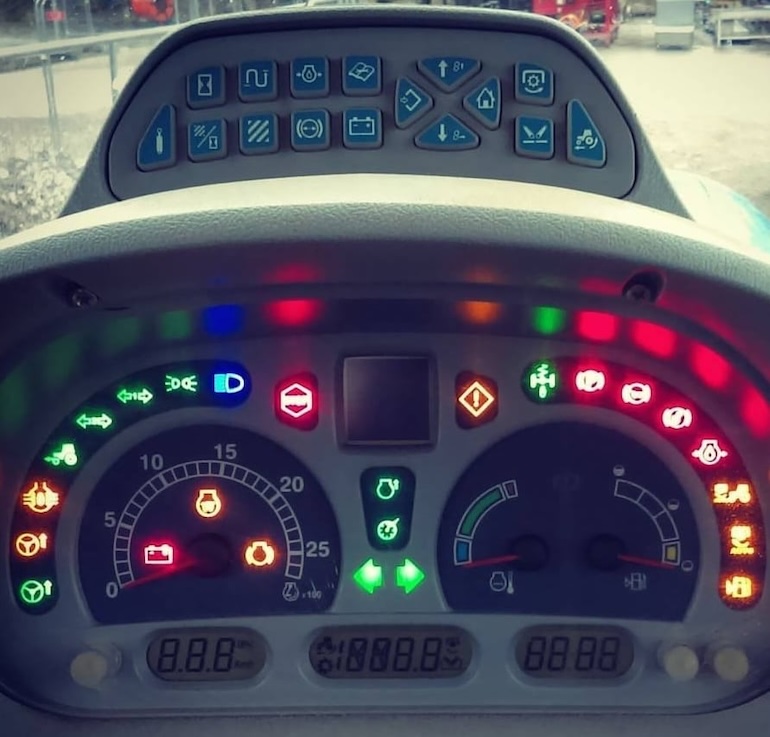
Here are some common colors used for New Holland tractor indicator / warning lights along with their meanings:
- Red warning lights indicate critical issues or malfunctions that require immediate attention to prevent damage to the tractor or ensure operator safety. Examples include low oil pressure, high engine temperature, or brake system failure.
- Amber or orange warning lights signify less severe issues that still need to be addressed but may not require immediate action. These could include low fuel levels, hydraulic system problems, or minor malfunctions.
- Green indicator lights typically indicate normal operation or system activation. For example, a green light may indicate that a particular system, such as the four-wheel drive, is engaged and functioning properly.
- Blue indicator lights are often used to convey information about non-critical systems or features. For example, a blue light may indicate that the high beam headlights are activated.
- Yellow warning lights are used to convey caution or provide informational messages that may not require immediate action. They could indicate things like low tire pressure or activated cruise control.
These colors serve as visual cues to help operators quickly assess the status of their New Holland tractor and take appropriate action as needed. It’s essential for operators to familiarize themselves with the meaning of each color to ensure safe and efficient operation of the equipment.
How to Reset New Holland Warning Lights?
To reset warning lights on a CNH vehicle, you typically follow a set procedure outlined in the operator’s manual. Here’s a general guide on how to reset warning lights on New Holland equipment:
- Identify the Issue: Before attempting to reset any warning lights, it’s important to identify the underlying issue triggering the warning. Consult the operator’s manual or use onboard diagnostics to determine the cause of the warning light.
- Address the Problem: Once you’ve identified the issue, take the necessary steps to address it. This may involve troubleshooting the problem yourself or seeking assistance from a qualified technician or dealership.
- Perform the Reset Procedure: After resolving the issue, you can attempt to reset the warning lights. The reset procedure can vary depending on the specific model and type of warning light. Refer to the operator’s manual for detailed instructions on how to reset each type of warning light.
- Follow Manufacturer Instructions: Follow the specific instructions provided by New Holland in the operator’s manual. This may involve a combination of actions such as turning the ignition on and off, pressing certain buttons or switches in a particular sequence, or using diagnostic tools.
- Verify Reset: After performing the reset procedure, verify that the warning light has been successfully reset. Check the instrument cluster or display panel to ensure that the warning light is no longer illuminated. If the warning light persists, double-check the troubleshooting steps and reset procedure.
- Monitor for Recurrence: Even after resetting the warning lights, it’s important to monitor the vehicle for any recurrence of the issue. Keep an eye on the instrument cluster or display panel for any new warning lights that may appear, indicating potential ongoing problems.
If you encounter difficulty in resetting the warning lights or if they continue to reappear after resetting, it’s advisable to seek assistance from a certified CNH technician or dealership. They can provide expert diagnosis and repair to ensure the vehicle operates safely and efficiently. Always refer to the specific instructions provided in the operator’s manual for your New Holland equipment to ensure proper and safe operation.
The updated instrument panel may include improved connectivity features, such as Bluetooth or Wi-Fi connectivity, enabling seamless integration with other devices or systems for data sharing, remote monitoring, and fleet management. The instrument cluster may now provide expanded information display capabilities, presenting a wider range of data and metrics related to New Holland equipment performance, operation status, DTC error codes, maintenance schedules, and more.
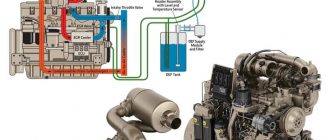
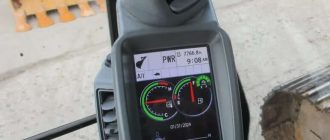
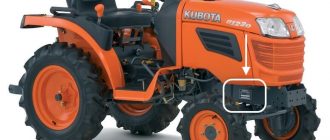
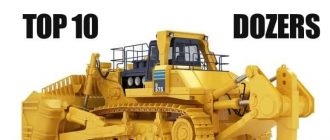
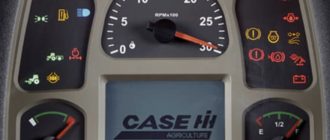
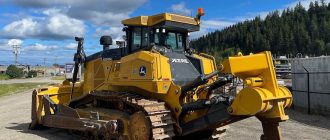
Do all New Holland tractors have the same instrument cluster / dashboard warning lights and symbols?
New Holland tractors may have different instrument clusters and dashboard warning lights depending on the model and year of the tractor. It is essential to consult the CNH operator’s manual for the specific model to understand the complete list of warning lights and symbols and their meanings.
Instrument lights: what are the Three lights 1 Battery, 2? 3 Temp. cannot find out what the second light is for
If the second light on your tractor is not the oil pressure warning light, it could be related to other functions like a hydraulic system warning or transmission oil pressure, depending on the specific model of your New Holland tractor. Check your tractor’s manual for exact details on the dashboard symbols specific to your model.